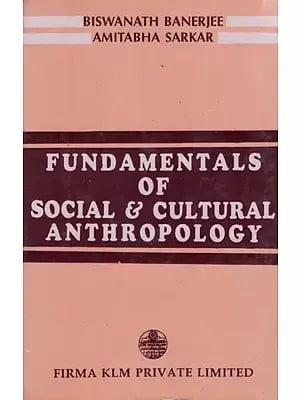Fundamentals of Social and Cultural Anthropology By Biswanath Banerjee
Fundamentals of Social and Cultural Anthropology By Biswanath Banerjee
Hardcover
Couldn't load pickup availability
Book Description
About the Authors
Shri Biswanath Banerjee (b. 1934) is a Reader in the Department of Anthropology at Calcutta University. Before this role, he taught at colleges in Bongaon and Habra in the 24 Parganas (North) district of West Bengal. Trained in anthropological research under renowned scholars such as Prof. M. Goswami, Prof. K. P. Chattopadhyay, Prof. N. K. Bose, and Prof. S. C. Sinha, he developed a deep understanding of field observation and theoretical frameworks from the ground level. His extensive field experience spans North-East India, West Bengal, and the Dhalbhum-Manbhum areas of Bihar.
Dr. Amitabha Sarkar (b. 1952) holds an M.Sc. and a Ph.D. from Calcutta University. His research focuses on ethnography and socio-cultural change, particularly regarding industrialization and cultural ecology. Dr. Sarkar has authored two significant works: Toto: Society and Change and Dhodia: Industrialization and Change in a Primitive Community. With over twenty research papers published in leading journals, he has also conducted extensive field investigations across rural and tribal areas in West Bengal, Odisha, Bihar, Rajasthan, Gujarat, and Madhya Pradesh. Currently, he serves as an Anthropologist and Head of Office at the Anthropological Survey of India in Jagdalpur, Bastar.
Preface
This book serves as an essential foundation for students of Anthropology. Many students enter higher education without prior knowledge of the subject, which is often first introduced at the undergraduate level in our country. Consequently, students and their guardians frequently lack awareness of the nature, scope, methods, and interdisciplinary connections of Anthropology.
Anthropology examines humanity from both physical and socio-cultural perspectives. Social-Cultural Anthropology encompasses the study of both primitive and contemporary societies. The theories and applications of this discipline arise from rigorous fieldwork, which is vital for keeping the subject alive and relevant. Indeed, fieldwork is the laboratory for anthropologists, offering invaluable insights that lead to meaningful contributions to human understanding.
The authors would like to express their gratitude to Dr. (Mrs.) Samira Dasgupta from the Anthropological Survey of India, Jagdalpur, and Shri Gopal Chakraborty, Lecturer in the Department of Anthropology at Midnapur University, along with research scholars Shaktipada Haldar, Abhijit Das, and Soumitra Basu from Calcutta University, for their invaluable suggestions in preparing this manuscript.
Lastly, the authors extend their thanks to their well-wishers and to typist Kumari Shanta Bala of Jagdalpur for their personal assistance and cooperation in producing this monograph.
Introduction
When exploring the field of Anthropology, one might ask: What is Anthropology? Each academic discipline is framed around fundamental questions that define its aims, objects, and scope. In the case of Anthropology, these questions center around humanity itself, making it a holistic study of mankind.
Anthropology revolves around three primary inquiries about humanity. The first question examines how humans originated and developed distinct physical features alongside the ability to communicate. The answer lies in the process of evolution. This evolutionary journey—from single-celled organisms to the emergence of modern humans—illustrates a complex transformation over millennia.
The evolutionary narrative begins with the amoeba and progresses through various phases, leading to the appearance of mammals. Over time, anthropoid apes emerged, eventually giving rise to Homo sapiens. An evolutionary tree would reveal the continuity from these early forms to modern humans. Comparative anatomy highlights how the structures of four-legged mammals evolved towards bipedalism, illustrating the gradual transition from apes to humans. Fossil discoveries in India and Africa further illuminate this continuum, offering insights into our shared ancestry and the so-called "missing link."
Share


